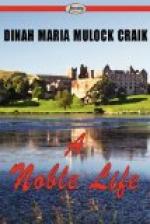“Why so?”
“I wished you to forget us, and all connected with us, and to choose some one more worthy, more suitable, to inherit your property.”
“But, Helen, that choice rested with myself alone,” said the earl, smiling. “Has not a man the right to do what he likes with his own?”
“Yes, but—oh,” cried Helen, earnestly, “do not talk of this. It caused me such misery once. Never let us speak of it again.”
“I must speak of it,” was the answer, equally earnest. “All my comfort —I will not say happiness; we have both learned, Helen, not to count too much upon happiness in this world—but all the peace of my future life, be it short or long, depends upon my having my heart’s desire in this matter. It is my heart’s desire, and no one shall forbid it. I will carry out my intentions, whether you agree to them or not. I will speak of them no more, if you do not wish it, but I shall certainly perform them. And I think it would be far better if we could talk matters out together, and arrange every thing plainly and openly before you go home to the Manse, if you prefer the Manse, though I could have wished it was to the Castle.”
“To the Castle!”
“Yes. I intended to have brought you back from Edinburgh—all of you,” added the earl, with emphasis, “to the Castle for life!”
Helen was much affected. She made no attempt either to resist or to reply.
“But now, my dear, you shall do exactly what you will about the home you choose—exactly what makes you most content, and your father also. Only listen to me just for five minutes, without interrupting me. I never could bear to be interrupted, you know.”
Helen faintly smiled, and Lord Cairnforth, in a brief, business-like way, explained how, the day after his coming of age, he had deliberately, and upon what he—and Mr. Menteith likewise— considered just grounds, constituted her, Helen Cardross, as his sole heiress; that he had never altered his will since, and therefore she now was, and always would have been, and her children after her, rightful successors to the Castle and broad acres of Cairnforth.
“The title lapses,” he added: “there will be no more Earls of Cairnforth. But your boy may be the founder of a new name and family, that may live and rule for generations along the shores of our loch, and perhaps keep even my poor name alive there for a little while.”
Helen did not speak. Probably she too, with her clear common sense, saw the wisdom of the thing. For as, as the earl said, he had a right to choose his own heir—and as even the world would say, what better heir could he choose than his next of kin—Captain Bruce’s child? What mother could resist such a prospect for her son? She sat, her tears flowing, but still with a great light in her blue eyes, as if she saw far away in the distance, far beyond all this sorrow and pain, the happy future of her darling—her only child.




